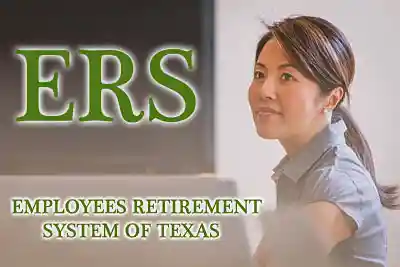Employees Retirement System of Texas
Can I get disability benefits if I work for the State of Texas?
Author: Attorney Lonnie Roach
Updated: 1/25/2024

If you are one of the over 300,000 Texas state or institution of higher learning employees covered by TIPP but your claim has been denied, it is time to contact a qualifiedTexas disability insurance attorney.
If you are an employee of the State of Texas or one of its agencies, you receive retirement and health insurance benefits as part of the Texas Employee Retirement System (ERS) or the Teacher Retirement System of Texas (TRS). These programs include not only retirement benefits, term life insurance and health insurance, but disability insurance for active employees.
The Texas Income Protection Plan (TIPP) is a benefit program that offers both short-term and long-term disability coverage to protect an employee’s income when they are unable to work due to illness, injury or pregnancy by providing a percentage of their monthly salary.
TIPP is available to active employees only – not to family members or retirees. It is managed by ReedGroup as third-party administrator which provides customer service and claims processing for both short-term and long-term disability benefits.
Employees may enroll for TIPP during the first 31 days of employment with coverage beginning right away.
It is important that an employee take advantage of this opportunity during their first month of employment; after that an applicant will not be enrolled without Evidence of Insurability. Not only will the applicant be required to pay all expenses related to obtaining Evidence of Insurability, there is no guarantee that they will be approved. If the employee is approved at a later stage, coverage begins the first day of the month following approval. An employee may also apply during Summer Enrollment if a qualifying event such as a marriage or birth has occurred and the applicant can provide Evidence of Insurability. Coverage would begin on September 1.
TIPP provides the following disability insurance coverage.
Short-term disability insurance (STD).
The maximum monthly STD payment is 66% of an employee’s monthly salary which is capped at $6600 per month for individuals earning more than $10,000 per month. The minimum STD payment is not less than 10% of an employee’s monthly income. This may occur if an employee is also receiving Workers Compensation, Social Security or another disability payment. Benefits are payable for up to five months; the maximum period of time an employee can receive STD benefits is 150 days. Before receiving benefits an employee must complete a 30-day waiting period or use all of their available sick time, including extended sick leave, donated sick leave and time from a sick leave pool, whichever period is longer.
If you have been denied long-term disability don’t give up! Contact a Disability lawyer at 512-454-4000 for a free consultation and get the benefits you deserve.
Long-term disability insurance (LTD).
The maximum monthly LTD payment is 60% of an employee’s monthly salary which is capped at $6,000 per month for individuals who are earning more than $10,000 per month. The minimum payment is not less than 10% of an employee’s monthly income which, like STD, may occur if the employee is receiving disability benefits from another source, like Social Security or Workers Compensation. The employee must complete the required waiting period of 180 days or use all available sick leave, extended sick leave, donated sick leave, and time from a sick leave pool, whichever is longer, before receiving benefits. The maximum benefit period will depend on the employee’s age at the time the disability begins, but once the employee is approved for benefits, payments will continue until the employee returns to work, reaches Social Security retirement age, or is no longer considered disabled. If an employee becomes disabled at age 69 or older, benefits are payable for up to 12 months.

In order to be eligible for disability benefits under TIPP, an employee must 1) provide a doctor’s statement certifying that they are totally disabled and unable to work, 2) complete the required waiting period, and 3) be approved for disability payments by a third-party administrator (ReedGroup).
During the first 24 months on disability, “total disability” refers to a participant who can’t do his or her job due to a disability that has been certified by an approved practitioner. After the first 24 months, total disability means the inability of the participant to perform the usual tasks of any compensated occupation for which the covered employee is reasonably suited by training, education, or experience, because of injury or sickness certified by an approved practitioner. This is typically referred to as the “any occupation” period.
If you have a pre-existing medical condition during three months prior to the date coverage begins for which you have received medical treatment, medical advice, medical services or prescription medication, disability benefits for that condition would not be paid for the first six months of your enrollment.
After six months, you must complete the waiting period before receiving benefits. If you are receiving disability benefits from another source such as Social Security or Worker’s Compensation, TIPP benefits will be reduced.
TIPP also has certain limitations and exclusions when disability benefits are not payable. For example, TIPP will not pay benefits if a participant is
- working or employed in any capacity;
- if the employee is on sick leave, extended sick leave, or sick leave pool;
- if the employee is not under the regular care of an approved practitioner; or
- if the employee was not making required premium payments at the time their total disability commenced.
An employee may enroll in short-term or long-term disability coverage, or both.
An employee covered by both short-term and long-term disability insurance may receive continuous benefits if an illness or injury prevents them from returning to work after five weeks. The transition process begins 18 weeks prior to the date long-term disability would be set to start.
You should file your disability claim as soon as possible, preferably within 90 days after the date of onset of your disability, but you must submit your LTD claim form, including the doctor’s statement, within 12 months of the first day you became totally disabled.
You can file online on the TIPP website at http://reedgrouptipp.com or call TIPP customer care at (855) 604-6230.
Before you file, you should have the following information available:
- the first day you missed work because of your disability;
- a diagnosis for your medical condition;
- the name, phone number and fax number or your treating physicians;
- balance of sick leave on the first day of your disability;
- dates of hospitalization, if any;
- the date you expect to return to work; and
- information about any other disability benefits you are receiving or are eligible for.
A claim manager will contact you for additional information within 24 hours after you file your claim.
The TIPP Administrator will then mail an acknowledgement packet to you containing a claim form. You should complete all the necessary forms and submit them within 10 business days. A claim manager will be assigned to work with you and keep you informed about the status of your claim. If your claim is approved, your payment will be issued on the first business day of the month.
If your disability claim is denied for any reason, you may file an appeal by calling TIPP Customer Care at ReedGroup at (855) 604-6230, Monday through Friday, 7 a.m. – 7 p.m.
Reed Group will mail you an acknowledgement letter within 48 business hours after receiving the appeal. Your case will be reviewed and a Reed Group Claim Manager will call you to inform you of their decision within 48 business hours after a determination has been made.

If you are a State of Texas Employee or an employee of a Texas institution of higher learning and have been denied disability benefits, contact Bemis, Roach & Reed to assist you with your claim. 512-454-4000 Get help NOW.
If ReedGroup denies your claim again, you must then file a grievance with the Employees Retirement System of Texas.
The ERS grievance must be filed no later than 90 days from the date on ReedGroup’s denial letter. If an employee decides to appeal an adverse determination by ERS, he can request that the case be set for a hearing on the merits at the State Office of Administrative Hearings (SOAH). The hearing will take place in Austin, Texas, no matter where the employee lives and works. The hearing will be conducted by an administrative law judge (ALJ). In preparation for the hearing, the employee is entitled to send written discovery to ERS, take depositions of relevant witnesses, and hire experts. Although the rules are somewhat different from litigating in state or federal court, the intent is to allow the employee a full and fair opportunity to prove his case. The burden of proof on all issues lies with the party seeking relief. TEX. INS. CODE § 1551.357(d) and ERS Rule § 67.55(b).
Unfortunately, the ALJ hearing doesn’t end the dispute.
The ALJ decision is basically advisory. The ERS Board of Trustees makes the final determination. If the final determination by ERS is unfavorable, the employee has the right to seek judicial review. The suit will be filed and heard in Travis County, Texas. TEX. INS. CODE § 1551.359.
If you are one of the over 500,000 Texas state or institution of higher learning employees covered by TIPP but your claim has been denied, it is time to contact a qualified Texas disability insurance attorney.
At the Law Offices of Bemis, Roach & Reed, attorneys, Lloyd E. Bemis, III, Lonnie Roach, and Greg Reed have been representing Austin and surrounding area clients wrongly denied insurance benefits since 1993. Contact us at 512-454-4000 for more information on how we can assist with your ERS claim today.

Long Term disability insurance companies routinely deny claims, call 512-454-4000 for information.
Bemis Roach and Reed has successfully handled many ERS claims.
A college professor in north Texas contacted Bemis, Roach & Reed to assist in challenging the denial of long term disability (LTD) benefits through Fort Dearborn Life Insurance Company.
At the time we were contacted, the client had already initiated an appeal of the Fort Dearborn denial by requesting a review from the Employee Retirement System of Texas (ERS). The claim was set for hearing before an administrative law judge (ALJ) with the State Office of Administrative Hearings in Austin, Texas. The college professor suffered from fibromyalgia. The disease had progressed to the point that work was no longer possible due to constant pain and fatigue. Fort Dearborn denied the claim when it was filed.
Bemis, Roach & Reed accepted the representation and began to litigate the case.
We arranged for our client to attend a functional capacity evaluation (FCE). The FCE supported our contention that our client could no longer work as a college professor. We also developed medical testimony from the client’s treating physicians. The case resolved to the satisfaction of all parties by confidential settlement prior to the ALJ hearing.
If you are an employee of an educational institution or if you are an employee of the State of Texas and have been denied disability benefits, contact the long term disability attorneys at Bemis, Roach & Reed. We are an Austin based law firm and can assist you with your claim.
Disability benefits are an important source of income for those who are unable to work. If you are not able to work due to accident or illness, you may be eligible for Social Security Disability or Long Term Disability benefits. If you have applied for benefits and been denied, contact the attorneys at Bemis, Roach and Reed for a free consultation. Call 512-454-4000 and get help NOW.
Try these links for further reading on this subject:
Why was my LTD claim denied?
How are Long-term Disability Policies Regulated? ERISA Explained
Austin ERS Attorney Lonnie Roach


![]()
Your Free Initial Consultation
Call now:
At Bemis, Roach and Reed, if we can't help you, we will try to find the right attorneys for you.
We offer each of our prospective clients a free no obligation one hour phone or office consultation to see if we can help you and if you are comfortable with us. We know how difficult a time like this can be and how hard the decisions are. If we can be of assistance to you and help you find a solution to your issue we will, even if that means referring you to another attorney.
Let's get you Started:
If you could provide us with some basic information about your claim we will get right back with you with a free case evaluation and schedule your Free Consultation Today.
You can also email us at: contact@brrlaw.com
Kind Words from Our Clients
![]()
“The attorneys and staff at Bemis, Roach & Reed have provided me and my husband, Jeff, with stellar advice, care, and service. They made navigating the SSDI process easy, painless, and as timely as possible. During this difficult time in our lives it was a tremendous relief to know they were on our side and keeping us updated on next steps and timelines. We also had questions about my husband’s long term disability insurance and they helped us get those questions answered and resolved without any additional fee. I highly recommend Bemis, Roach & Reed.” – Kelli G
![]()
“I needed a lawyer for my case and had googled best lawyers. They came up first on my list and decided to give them a call. From the moment I called I knew I chose the right people. They said they would fight for me and fight they did. They knew what they were doing and kept good communication throughout the process. If you need someone that will listen, understand, and fight then these are the people. HIGHLY RECOMMEND.” – Marcel L.
![]()
“I’ve had a great experience working with Bemis, Roach & Reed for my disability case. I spent two years fighting on my own, until I was informed to look for a disability lawyer. Right away, sending in questions was a breeze, and from the moment my case was accepted, everything became a major weight off my shoulders. My newest appeal was filed for me, my medical records and case history sorted for me, and I could finally focus on my appointments and treatment with a little less worry. Everything was explained to me in a way that made sense, the process was set out in an easy to understand way. And, just like that, at the beginning of July 2023, my claim was accepted!” – Sunshinemutt





